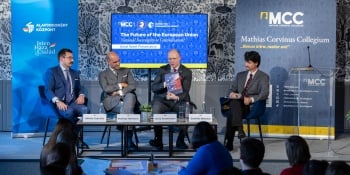Published: 08.04.2020

The concept of ‘gender’ is gradually replacing the concept of ‘sex’ in numerous documents issued by international organisations. This trend is highly questionable as ‘gender’ is an ideological term rooted in radical Marxist concepts. The term is also used in the most important EU documents on equality policy. At the request of the European Parliament’s Directorate-General for Parliamentary Research, the Ordo Iuris Institute presented its position on the concepts of ‘gender’ and ‘gender equality’.
The essence of the concept of gender, both in social sciences and in documents issued by international bodies, is the radical belief that the existing gender roles and differences between women and men are the result of oppression to which women have been subjected throughout history. The ideological nature of the term ‘gender’ is reflected in the definition created by the Council of Europe's Group of Specialists in Gender Mainstreaming, which explicitly stated that “gender is not only a socially constructed definition of woman and man, but also a socially constructed definition of the relationship between the sexes, which includes an unequal power relations resulting in the domination of men and the subordination of women in most spheres of life”.
Therefore, the term ‘gender’ defines sex as a social construct, ignoring its biological dimension. In addition, it draws from the concepts visible in the Marxism doctrine. The difference is the change of the centre of gravity from a class struggle to the ‘eternal’ struggle between the two sexes, which could only be ended by eliminating gender differences. The concept of socio-cultural gender is a natural consequence of the way of thinking that a truly free person can only be free if he or she is liberated from all imposed social norms. According to feminist doctrine, one of these social norms is precisely the concept of gender and its roles, and the supposedly unequal relations between women and men would be one of the main causes of the alleged structural discrimination against women.
The ideological nature of the concept of ‘gender’, clearly visible both in documents issued by the UN Committee on the Elimination of Discrimination against Women – CEDAW and in the Istanbul Convention, raises serious doubts as to the legitimacy of its application in official acts. The term is based on erroneous assumptions - social gender roles do not exist in isolation from biological gender, which would suggest the concept of ‘socio-cultural gender’. The biological source of human sexuality is mainly supported by modern achievements of science, especially genetics. The origin of this concept, which refers directly to Marxist doctrine and reduces the relationship between men and women to an eternal struggle for power, is also alarming.
The concept of gender equality is also a misconstruction. It does not apply to the Polish Constitution or to any other Polish legislative act. The term ‘gender equality’, according to the Ordo Iuris Institute, should be replaced by ‘equality between women and men’.
“The term which should be used in Polish and international law is an unambiguous and ideologically uncharacteristic concept of biological sex. The use of this term in no way precludes the inclusion of human sexuality in various social and cultural contexts, the impact of which on the experience of women and men is beyond doubt. However, while it is not possible to completely omit the social context in relation to women and men, the omission of the biological dimension of human sexuality is a completely wrong approach,” points out Magdalena Olek, Deputy Director of the Center for International Law of the Institute for Legal Culture Ordo Iuris.

17.04.2025
• The Ordo Iuris Institute has prepared an opinion for the UN as part of a thematic report on surrogacy and its impact on the rights of women and children.

09.04.2025
• On April 8, the Ordo Iuris Institute presented the Polish version of a document with proposals for reforming the European Union, prepared jointly with Hungary’s Mathias Corvinus Collegium (MCC).


03.04.2025
• The Advocate General of the Court of Justice of the European Union (CJEU) has issued an opinion in a case involving a same-sex couple’s demand for their German marriage to be recognized as a marriage in Poland.